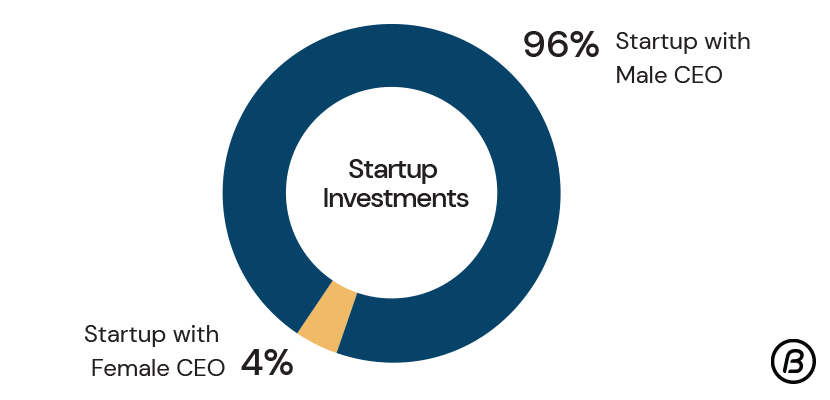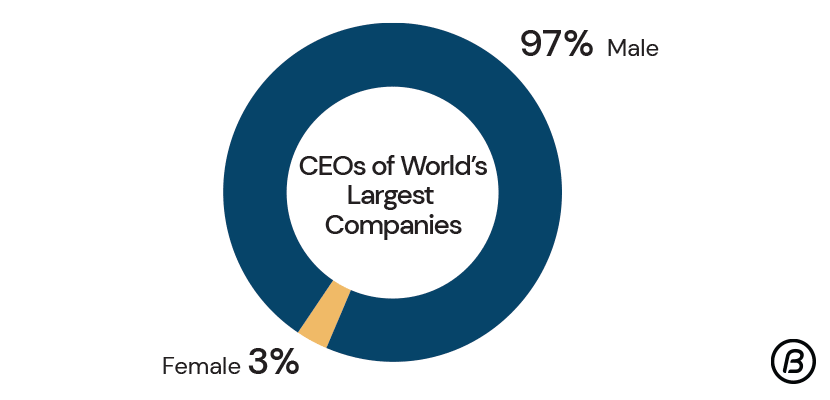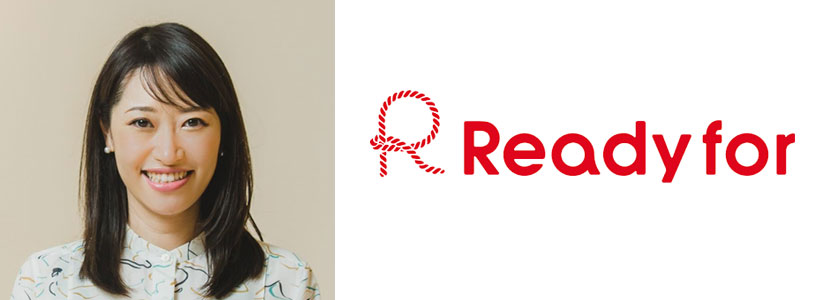Gender gap in various industries has been a topic of discussion with there being a huge gap in the percentage of women who are startup entrepreneurs.
This is especially true in Japan, where the gender gap in the startup community is even wider than the U.S. This article by Business Insider Japan explains that in Japan only 4.2% of corporate executives are female. Also, in one Japanese startup event, the percentage of female speakers was less than 5%.
The startup world is completely male dominated
According to Amy Jin, who spoke at an event by Startup Grind on Women’s Leadership, there are more CEOs named Mike than women CEOs in the world.
As a matter of fact, in 2020: $125B of $130B deployed by venture capitals in the U.S. went to startups with male CEOs. This means that among all Startup investments, only 4% go to companies with female CEOs. Also, less than 3% of the world’s largest companies have women CEOs.

The stats look very disproportional in the investment field as well.
Only 12% of decision-makers at VC firms are women
2.4% of founding partners are female
65% of venture firms still have zero female partners
* Source: HBR.org, written by Ashley Bittner and Brigetter Law

Women in business show high performance
Jin explains that female business leaders show high performance in the startup and business fields.
Companies with 30%+ women executives are more likely to outperform than the ones with fewer than 30% women executives
Women-led funds outperform male counterparts by up to 3x
Woman founded companies outperform 2x on return investment
Companies with women on their founding teams are more likely to exit one year faster than those without
* Stats by McKinsey, Financial Times, BCG Research
Female entrepreneurs are increasing in Japan
As the stats show, the majority of entrepreneurs, investors, and people in startups are overwhelmingly male.
In spite of this situation, there has been an upward trend of female entrepreneurs in Japan. We are very excited to introduce some of the emerging female entrepreneurs beating the odds.
Tomoko Namba – Founder of DeNA

In 1999 she founded DeNA, one of Japan’s largest mobile social network and mobile game companies. She stepped down in 2011 to focus on her family and personal life.
Namba received an MBA from Harvard Business School and was the third Japanese woman to become a partner at McKinsey & Co. She started DeNA after working on a consulting assignment with Sony’s So-net while she was a consultant at Mckinsey.
Rika Shiiki – Co-Founder & President of AMF

While still in highschool, Rika started her company, AMF, a marketing startup run entirely by girls in their teens. Rika is already consulting for major Japanese companies on product development, research, production, and many other areas.
She’s developed a reputation as a “marketer who hears the voices of young girls around Japan.” Even outside of Japan people have begun talking about her, with one observer saying that “in Silicon Valley, Rika is recognized as an impressive business woman with a ton of potential.”
Chika Tsunoda: Founder & CEO of Anytimes

After graduating from Keio University, Faculty of Law in 2008, Chika joined Nomura Securities working in sales, and then worked for CyberAgent, where she was in charge of PR planner.
In 2013, she founded Anytimes to launch a skill share service platform in Japan and released the service “ANYTIMES.”
Currently, she serves as a Director of Qnoir, an online community service for beauty professionals.
Miku Hirano – CEO & Founder of Cinnamon AI

Miku is a serial entrepreneur and CEO of Cinnamon. Her start-up has a disruptive AI technology to extend human potential and is funded by Sony and other investors.
This isn’t her first experience with business success as she previously founded Naked Technology, which developed a mobile technology platform and was acquired by Mixi in 2011.
She has been selected by Nikkei Newspaper as one of the 40 young leaders who will change the future of Japan.
Mariko Hashimoto – Founder & CEO of Delighted

Mariko started her career as a receptionist in 2005. She worked as a receptionist at five major companies and throughout her 11-year career as a receptionist, she estimates that she assisted more than 1.2 million people.
In January 2016, Mariko founded her own company, Delighted, utilizing her extensive experience to offer more effective reception services in a wide range of areas.
In January 2017, the company released a cloud-based receptionist system called Receptionist – the first of its kind in Japan.
Kahoko Tsunezawa – Founder & CEO of KIDSLINE

After working at Recruit Holdings and Rakuten, she founded her own startup, Trenders, from her home at the age of 26.
In 2012, she became the then youngest female entrepreneur to be listed on the TSE Mothers Index. In 2014, she founded another startup, KIDSLINE — an online babysitter matching service.
With the goals of cultivating a babysitting culture across Japan and establishing a society where women can shine, her company offers a safe and reliable childcare platform — even at a moment’s notice — with hiring rates starting from JPY1,000 (~$10 USD) per hour.
Marie Kondo – Founder of KonMari Media

Also known as Konmari, Marie is a Japanese organizing consultant, author, and TV show host. Marie is best known for her bestselling book, The Life-Changing Magic of Tidying Up, in which she explains the KonMari method.
The KonMari method emphasizes the need for decluttering and keeping only those things, which “spark joy”. Kondo’s obsession with organizing and tidying up spaces started at a young age. When she turned 19, she started her own consulting company that focused on organizing other people’s homes and offices.
She was subsequently named among the 100 most influential people in 2015 by TIME magazine. Since achieving this, Kondo has been featured in a successful Netflix series and several other TV shows, which has established her as a cultural icon across the globe.
Haruka Mera – Founder of READYFOR

Haruka is a founder of READYFOR. It is the first and biggest crowdfunding service ever in Japan, targeting creators and social entrepreneurs.
In 2010, Haruka participated in a four-month course in technology entrepreneurship at Stanford University. The experience inspired her so much she decided to work full-time for Ohma whom she had been in touch with since her undergraduate years.
Through READYFOR, she aspires to realize a world where every individual achieves whatever he/she wants regardless of financial status.
Along with being a founder of READYFOR, she is also a member of Global Shapers, an initiative from the World Economic Forum. She attended the World Economic Forum in 2012 as the youngest member from Japan.
Nirei Ayaka – Founder & CEO of TimeLeap

Ayaka attended Shonan International School for kindergarten before later going to a public elementary school. However, she felt uncomfortable with the existing education system in Japan.She consulted with the headmaster of the school, which he had attended in the past, and asked him to establish a new elementary school. And she eventually acquired the school.
When she was in the second year of junior high school, she established GLOPATH with investment from her aikido teacher and became the president.
She was involved in educational businesses such as on-site classes for educational institutions and later in 2014, she acquired her alma mater, Shonan International School, in order to support its development.
She entered Keio University in August 2016 and while still in school, she established TimeLeap and became the CEO. She has been developing education businesses since then and runs a school consultant business.
Ayaka was selected for Forbes 30 UNDER 30 JAPAN.
Shiori Inakatsu – Founder & CEO of UTSUWA

Also known as Gomi Hayakawa, Shiori was born in Tokyo, graduated from Tama Art University, Department of Graphic Design and is currently the CEO of Utsuwa, which operates an apparel brand for people with concerns about their body shapes.
She started making accessories in her first year of high school, designing and selling printed tights while in the middle of taking exams. Immediately after entering university, she launched the one-piece brand “GOMI HAYAKAWA,” followed by her sister brand, the lingerie brand “feast” in August 2014.
She launched the one-piece brand “Double Chaka” in October 2017, and continues to sell mainly through ecommerce. After several pop-up stores, she opened a permanent direct management store “LAVISHOP” at Laforet Harajuku in 2018, and started a sanitary products project “illuminate” in 2019.
Akiko Naka – Founder & CEO of Wantedly

Akiko serves as the Founder and CEO of Wantedly, one of the largest social recruiting platforms in Japan. Her dream is to create a world where “people are excited about their work.”
Following its official launch in February 2012, Wantedly now has over 20,000 registered companies and more than 1.2 million active monthly visitors.
Prior to Wantedly, she was a growth coordinator at Facebook Japan, contributing in the marketing and product development of Facebook in Japan. Before joining Facebook, she worked at Goldman Sachs in equity sales. She is also a manga artist and founded Magajin, an international manga sharing platform.
Takako Kansai – Founder & CEO of Zaim

After working as a journalist and an editor at Nikkei Business Publishing, from 2001 Takako became involved in the planning and development for two web venture companies.
She taught herself technology for service and app development, and released “Zaim,” a family bookkeeping app as a personal service in 2011.
Zaim was incorporated in 2012 and the company has grown into one of the biggest service providers in Japan, capturing the triple crown in Japan for the top App in its category on the Apple App Store, Google Play and Windows Store, solely through word of mouth.
She is a member of “Workshop on the Utilization of Information in the Distribution and Logistic areas” by the Ministry of Economy, Trade and Industry.
We need more role models
Though there are many female entrepreneurs in Japan and the number continues to increase, we still need more. One of the best ways to solve this disparity is to have more role models.
In order to achieve this goal, I would like to see a system to back up and support women entrepreneurs, and for them to have the courage to take their first steps as entrepreneurs.
I hope that the entrepreneurs introduced here will continue to serve as role models for the future, and that the startup world will become more diverse.
Read more: blog.btrax.com
